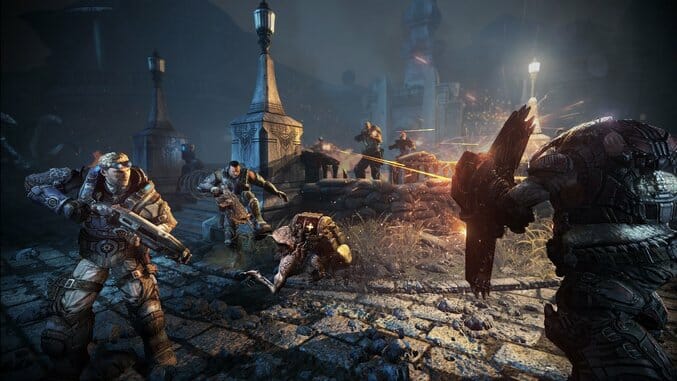Gears of War: Judgment (Xbox 360)

Nothing happens for certain in Gears of War: Judgment, which is funny, because the campaign’s story operates on the premise that its main characters have testified to its events under oath in a court of law. And yet, the game changes in subtle ways with each play-through, due to the machinations of a Left 4 Dead-inspired AI director that dictates which types of Locust will best provide a challenge, moment to moment, for the heroes. Each level also begins with the option to play a “declassified” version of events, which basically makes the level harder.
But what really happens? Who knows. And more importantly: Who cares? Gears of War: Judgment doesn’t seem to.
The dialogue, the cut-scenes, and the end of the game don’t change according to which enemies spawn or which missions have been played while declassified or not. No matter what, by the end of the game, there’s the same big spider-boss and the same unlockable chapter Aftermath, a 30-minute mini-campaign set during the time-line of Gears of War 3—which mostly just reminds me how much more fun Gears of War 3 was.
Do I sound disappointed? I am disappointed. Yes, Gears of War games are stupid, but they’re fun. Judgment isn’t even fun. It’s just stupid.
I admit, I would have preferred different protagonists. If I couldn’t have Marcus and Dom, could I at least have Anya or Sam or Jace? No? Oh, well. So Judgment won’t have the romance of, say, Marcus and Dom (go with it) or any sarcastic one-liners from Sam, but at least Baird and Cole will tell me some good jokes, right?
No dice. I don’t think I cracked a smile this whole game. Did lead writers Tom Bissell and Rob Auten forget to bring the funny? You’d think a younger version of Cole would be even more endearing and hyperactive than the grown-up one, but no—this Cole seems downright shy in comparison. And Baird? Boring. I can’t believe I’m calling Baird boring.
It doesn’t help that much of the game’s dialogue takes place in voice-over. The cut-scenes flash back periodically to Baird, Cole, and their two other forgettable new squad-mates Paduk and Sofia testifying in court because they all stole a huge missile against their superiors’ orders. We all know how hilarious, charming, and not at all stilted or wooden people sound when they’re testifying in court. Who thought this was a good idea?
The stakes in Judgment are low, and they just can’t ever get that high. We already know from the outset that all of these characters are going to live, because this entire campaign takes place in a flashback (spoilers in this parenthetical: We find out that one of the two new characters dies in Aftermath, but we don’t even get to see it happen). Also, the main characters here are Cole and Baird. We know they’re going to make it, and we also know that they’re never going to learn any useful new facts about their enemies. If they had, it would’ve come up in a prior Gears game. Nothing can happen in this game that really matters, and the whole game seems all too aware of that limitation.
The writers should have tried to deliver new plot points or information about the Locust and the Lambent in some other way, even if Cole and Baird couldn’t be involved—perhaps Paduk and Sofia could have gone off on their own to discover more elsewhere. Gears of War 3 left a lot of open questions, including a big uncomfortable one about whether humans even deserve to inhabit Sera at all, considering the Locust lived there first. But Judgment ignores that question entirely, instead choosing to focus solely on the black-and-white morality of “shoot the monster! Monster bad!”
This black-and-white theme gets reinforced by the game’s nigh-constant score tallies. Every five to ten minutes, the game pauses and tells me my score for the round I just defeated. Lest I get too excited and start feeling like I’m actually inside the story, Judgment yanks my brain back to reality and reminds me that this is a section of a video game and that I just got 19 kills. Go, me. Each round also awards me stars—one to three, depending on how well I did. After you get 40 of these and unlock the Aftermath chapter, the stars feel like little more than stickers for a job well done.
